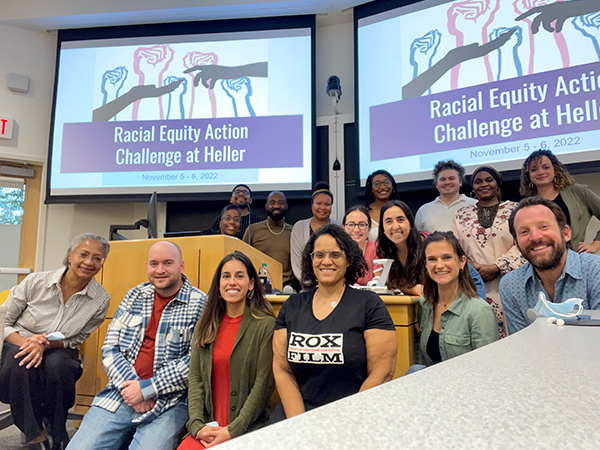
The Racial Equity Action Challenge at Heller, or REACH, held its second annual event over the span of a weekend in early November 2022. This intensive, two-day challenge creates an intentional space for teams of students to collaborate and propose innovative solutions to racial equity issues at Heller.
REACH participants are supported by a team of mentors with deep experience in racial justice-focused organizing, project design and implementation. This year, 10 participants formed two teams and spent the weekend creating workable solutions and proposals that confront racial disparities in the Heller community.
A key component of REACH is to move beyond conversations to community action. To support this push for action, two teams with potential for impact received $1,500 in Phase 1 funding towards implementation. Both projects are set to move forward, with final proposals due at the end of the calendar year.
Learn more about the 2022 REACH teams’ winning proposals below.
2022 Funded REACH Teams
Asset Builders
Danny Mollericona Alfaro, MA COEX’24; Jackson Hignite, MPP’23; Bob Hitt, MPP’23; Fernanda de la Torre Marín, MA SID’23; Alton McCall, MBA’22
Many Heller students, particularly international students and those from disadvantaged socioeconomic backgrounds, lack knowledge and positive experiences dealing with financial systems in the United States – such as the credit and tax systems. The current solutions to address these problems still leave many gaps in knowledge and access. To address these issues, Asset Builders proposes a four-pronged program focusing on: tools to build financial assets; networking; credit management; and tax education and preparation.
Ethos Global Cafe
Marwa Elhaj, MA COEX’24; Roxann Mascoll, BCC Staff; Katherine Nace, MPP’24; Ashley Robinson, MBA’23; Debbie Stenoien, MBA/MPP’24
Some members of the Heller community do not experience a sense of belonging, a problem exacerbated by existing silos between degree programs and an overall lack of communal meeting spaces where students have the opportunity to share culture and engage in dialogue with others. To address these issues, Ethos Global Cafe proposes a place-based strategy using food and beverage for community connection, cultural exploration and critical conversation. This would include “popportunities” (pop-up events to engage the community), as well as facilitated spaces for casual interactions with the community therapist, career services, faculty, and others.
